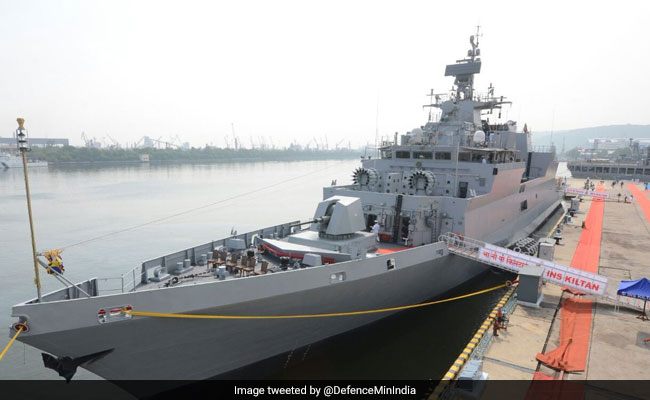INDIA
DEFENCE CONSULTANTS
|
WHAT'S
HOT? –– ANALYSIS OF RECENT HAPPENINGS |
INS Kiltan CommissionedSource: India Today |
|
20 October 2017 Union Defence Minister Nirmala Sitharaman commissioned the third of four indigenously built Anti-Submarine Warfare (ASW) stealth corvettes “INS Kiltan” under Project 28 (Kamorta class) into the Indian Navy at Visakhapatnam’s Naval Dockyard on 15 October 2007.
New Delhi: Union Defence Minister Nirmala Sitharaman on Monday commissioned the third of four indigenously built Anti-Submarine Warfare (ASW) stealth corvettes “INS Kiltan” under Project 28 (Kamorta class) into the Indian Navy at Visakhapatnam’s Naval Dockyard. The commissioning ceremony was attended by Admiral Sunil Lanba PVSM, AVSM, ADC, Chief of the Naval Staff and host of other dignitaries. Indigenously designed by the Indian Navy's in-house organization, Directorate of Naval Design and built by Garden Reach Shipbuilders and Engineers (GRSE), Kolkata; Kiltan is the latest indigenous warship after Shivalik class, Kolkata class and sister Ships INS Kamorta and INS Kadmatt to have joined the Indian Navy’s arsenal where in a plethora of weapons and sensors have been integrated to provide a ‘Common Operational Picture (COP)’. It's India’s first major warship to have a superstructure of carbon fibre composite material resulting in improved stealth features, lower top weight and maintenance costs. The ship is also the first major warship to have undertaken Sea Trials of all major weapons and sensors as a pilot project prior delivery by shipyard to Indian Navy and is ready to be operationally deployed on the day of joining the Indian Navy. The ship’s weapons and sensors suite is predominantly indigenous and showcases the nation’s growing capability in this niche area. With a displacement of 3500 tonnes, the ship spans 109 meters in length and 14 meters at the beam and is propelled by four diesel engines to achieve speeds in excess of 25 knots with an endurance of 3450 nautical miles. The installed propulsion and auxiliary systems provides very low radiated underwater noise feature, required for anti-submarine warfare. Enhanced stealth features have been achieved by ‘X’ form of Hull, full beam superstructure, inclined ship sides and use of Infra Red Signature Suppression (IRSS) system designed by NSTL for cooling the Engine and Generator exhausts. About 81 percent of the ship is indigenous and it is well equipped to fight in Nuclear, Biological and Chemical (NBC) warfare conditions. The ship in the future would also be installed with short range SAM system and carry an integral ASW Helicopter. The ship derives its name from one of the islands in Aminidivi group of the strategically located Lakshadweep and Minicoy group of Islands. The ship also boasts of the proud legacy of the erstwhile Petya Class ship of same name ‘Kiltan (P79)’ built in USSR, which had actively participated as Task Force Commander in ‘Operation Trident’ during 1971 Indo-Pak war and had served the nation with distinction throughout her illustrious service life from 30 October 1969 to 30 June 1987. The ship is manned by a team comprising 13 officers and 178 sailors with Commander Naushad Ali Khan at the helm as her first Commanding Officer. Upon commissioning, the ship would become an integral part of the Eastern Fleet and would enhance Indian Navy’s reach, striking capability and sustainability in the Indian Ocean Region. |
